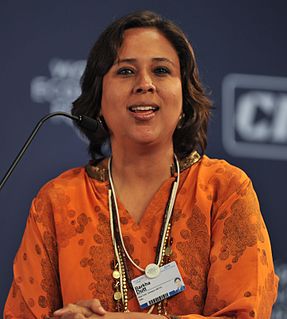Top 100 Quotes & Sayings by Barkha Dutt
Explore popular quotes and sayings by an Indian journalist Barkha Dutt.
Last updated on April 14, 2025.
I don't care if a flight attendant is fat as long as she doesn't sneak back to the galley for a gossip when she should be pushing down the food trolley. I get annoyed when the food trays are slapped down on my seat by bored and disinterested men and women. I look for warmth and comfort, not cold efficiency.
The real challenge to upholding India's freedoms is how patchy and individual-driven it is when it comes to the judiciary. The system is so arranged that instead of legal precedent and case law setting the template for the court's interventions, the idea of justice is guided by what Judge A or Judge B may think.
For too long now we have watched the Left perch prettily on the periphery of the government, enjoying influence without accountability. In the two states where it has actually had to deal with the everyday reality of governance, look at how the Chief Ministers have struggled to marry textbook diktats with the actualities of a Changing India.

















